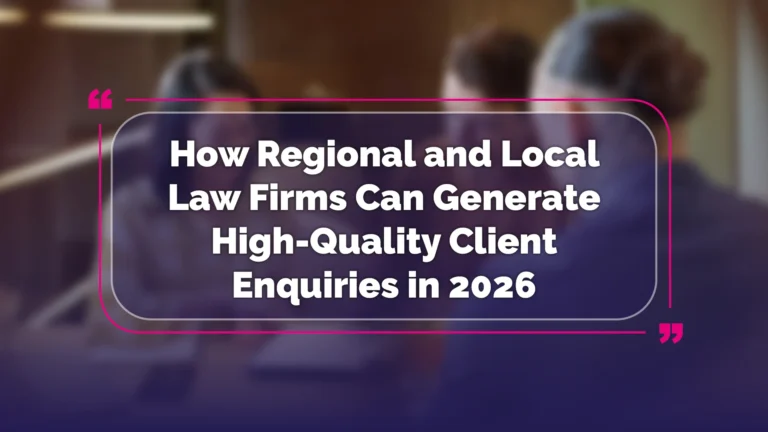Introduction
Digital marketing has profoundly impacted the legal sector in the UK. According to a 2023 report by the Law Society, law firms that invested in digital marketing saw an average increase in client acquisition by 40% compared to those relying solely on traditional methods. This statistic underscores the significant shift in legal marketing, where digital strategies are becoming indispensable.
The landscape of legal marketing has evolved remarkably, transitioning from traditional marketing avenues such as print advertising, broadcast, direct mail, and outdoor advertising to more dynamic and far-reaching digital platforms. Small and medium law firms in the UK face unique challenges in this competitive market, such as limited budgets, fewer resources, and the constant pressure to differentiate themselves from larger practices. However, digital marketing offers a level playing field, allowing smaller firms to compete effectively and attract clients through strategic online presence.
An effective digital marketing strategy is crucial for client acquisition and retention in today’s legal industry. By leveraging digital tools, law firms can enhance their visibility, establish authority, and engage more effectively with potential clients. This integrated approach can combine various digital strategies to create a cohesive marketing plan, enabling firms to maximise their outreach and impact.
In this article, we will explore five essential digital marketing strategies tailored for small and medium UK law firms: Search Engine Optimisation (SEO), Content Marketing, Social Media Engagement, Email Marketing, and Pay-Per-Click (PPC) Advertising. These strategies are practical, cost-effective, and designed to help firms of all sizes achieve their marketing goals.
Key Takeaways
- Search Engine Optimisation (SEO): Boosts visibility on search engines, attracts organic traffic, and enhances local presence.
- Content Marketing: Establishes thought leadership, builds trust, and supports other marketing efforts.
- Social Media Engagement: Enhances brand awareness, credibility, and networking opportunities.
- Email Marketing: Nurtures client relationships, generates leads, and supports content distribution.
- Pay-Per-Click (PPC) Advertising: Provides targeted exposure, measurable results, and high ROI potential.
Digital marketing techniques, such as email marketing and marketing automation, enhance campaign effectiveness. Traditional marketing relies on offline channels like print, broadcast, direct mail, and outdoor advertising, contrasting with digital marketing techniques. Implementing these strategies synergistically can significantly enhance a firm’s digital presence, leading to improved client acquisition, retention, and overall ROI.
Search Engine Optimisation (SEO)
What is SEO and its Importance?
SEO, or Search Engine Optimisation, is the process of optimising your website to rank higher in search engine results pages (SERPs), thereby increasing organic traffic. For law firms, SEO is crucial as it enhances online visibility and attracts potential clients actively searching for legal services. Unlike traditional marketing methods such as print and broadcast advertising, which rely on offline channels, SEO leverages digital techniques to reach audiences online.
Organic vs. Local SEO
Organic SEO focuses on improving overall website ranking on SERPs through keyword optimisation, quality content, and backlinks. Local SEO, on the other hand, targets a specific geographic area, ensuring your firm appears in local searches and Google My Business listings. Both are vital for law firms to attract clients within their service areas.
On-Page SEO Techniques
- Meta Descriptions: Write compelling meta descriptions that include primary keywords and provide a brief overview of the page content.
- Title Tags: Ensure each page has a unique title tag with relevant keywords.
- Header Tags: Use H1, H2, and H3 tags to structure content, making it easier for search engines to understand.
- Keyword Optimisation: Integrate keywords naturally throughout your content without keyword stuffing.
Off-Page SEO Strategies
- Backlink Building: Acquire high-quality backlinks from reputable websites to enhance authority.
- Online Directories: List your firm in online legal directories to improve visibility.
- Google My Business Optimisation: Ensure your Google My Business profile is complete, accurate, and regularly updated.
Search Engine Marketing
Search engine marketing (SEM) is a vital component of digital marketing that focuses on improving visibility through paid ads on search engine results pages (SERPs). Brands leverage SEM to bid on keywords related to their products, thereby capturing leads and enhancing website traffic effectively.
Mobile Optimisation and Page Speed
Given the increasing use of mobile devices, ensure your website is mobile-friendly and loads quickly. Slow page speed can negatively impact user experience and SEO rankings.
Keyword Research for Legal Services
- Identify Relevant Keywords: Use tools like Google Keyword Planner to find keywords related to your legal services.
- Analyse Competition: Look at competitors’ keywords to identify gaps and opportunities.
- Long-Tail Keywords: Focus on long-tail keywords that are specific and less competitive.
Role of Content in SEO
Content is king in SEO. Regularly update your website with blog posts, practice area pages, and FAQs that address common legal questions and issues. This not only improves SEO but also positions your firm as a thought leader.
Optimising for Local Search Terms
Include location-specific keywords in your content and metadata to attract local clients. For example, “family lawyer in London” or “corporate solicitor in Manchester.”
Common SEO Mistakes and How to Avoid Them
- Keyword Stuffing: Overusing keywords can lead to penalties. Use them naturally.
- Ignoring Mobile Users: Ensure your site is mobile-friendly.
- Poor Quality Content: Focus on creating valuable, informative content.
- Neglecting Local SEO: Optimise for local search to attract nearby clients.
Content Marketing
What is Content Marketing and Its Relevance?
Content marketing involves creating and distributing valuable content to attract and engage your target audience. For law firms, it’s a way to demonstrate expertise, build trust, and attract potential clients. Unlike traditional marketing methods like print and direct mail, content marketing leverages digital channels to reach a broader audience more efficiently.
Types of Content Effective for Law Firms
- Blogs and Articles: Regularly publish informative articles on legal topics relevant to your practice areas.
- Whitepapers and Ebooks: Offer in-depth guides on complex legal issues.
- Videos and Podcasts: Create video content and podcasts discussing legal topics and providing insights.
- Infographics: Use infographics to simplify and illustrate complex legal processes.
Establishing Thought Leadership and Building Trust
Content marketing helps establish your firm as an authority in your field. By consistently sharing valuable insights and legal knowledge, you build credibility and trust with your audience.
Framework for Creating a Content Strategy
- Identify Target Audience: Understand who your clients are and what information they need.
- Set Goals: Define what you want to achieve with your content marketing strategy (e.g., brand awareness, lead generation).
- Choose Topics: Select topics that address your audience’s pain points and interests.
Creating a Content Calendar and Maintaining Consistency
Plan your content in advance with a content calendar. This ensures regular posting and helps maintain consistency, which is key to retaining your audience’s interest.
Tailoring Content to Different Stages of the Client Journey
Create content that addresses the various stages of the client journey, from awareness to consideration to decision. For instance, blog posts for awareness, case studies for consideration, and client testimonials for decision.
Supporting Other Marketing Efforts with Content
Content marketing supports SEO by providing keyword-rich content, enhances social media engagement by providing shareable material, and complements email marketing by offering valuable information to subscribers.
Best Practices for Content Creation
- Tone and Style: Maintain a professional yet approachable tone.
- Formatting: Use headers, bullet points, and short paragraphs for readability.
- Web Readability: Ensure your content is easy to read on screens, with clear fonts and sufficient white space.
Repurposing Content Across Different Channels
Repurpose your content to reach a wider audience. For example, turn a blog post into an infographic or a video, or compile several blog posts into an ebook.
Measuring Content Marketing Success
Track metrics such as engagement (likes, shares, comments), lead generation, and conversion rates to evaluate the effectiveness of your content marketing efforts.
Social Media Marketing
Relevant Social Media Platforms for UK Law Firms
- LinkedIn: Ideal for professional networking and sharing thought leadership content.
- Twitter: Useful for real-time updates, legal news, and engaging with a broader audience.
- Facebook: Good for building community and sharing firm updates and content across various social media channels.
Benefits of Social Media for Building Brand Awareness and Credibility
Social media enhances your firm’s visibility and helps establish credibility. By consistently sharing valuable content and engaging with your audience, you can build a strong online presence.
Creating a Social Media Strategy Aligned with Overall Marketing Goals
Align your social media activities with your firm’s broader marketing objectives. Define your target audience, set measurable goals, and choose the right platforms.
Tips for Creating Engaging Social Media Content for Lawyers
- Share Industry Insights: Post updates and commentary on legal developments.
- Client Success Stories: Highlight successful cases and client testimonials.
- Behind-the-Scenes Content: Share insights into your firm’s culture and team.
Consistency and Authenticity in Social Media Presence
Maintain a consistent posting schedule and authentic voice. Authenticity builds trust and engagement with your audience.
Thought Leadership on Platforms like LinkedIn
Leverage LinkedIn to publish articles, share insights, and participate in industry discussions. This positions your firm as a thought leader.
Using Social Media for Networking and Relationship Building
Engage with peers, potential clients, and industry influencers. Comment on posts, participate in discussions, and join relevant groups.
Ethical Considerations and Best Practices for Social Media Use
Adhere to professional conduct rules and maintain client confidentiality. Avoid sharing sensitive information and ensure your content is compliant with legal advertising regulations.
Managing Online Reputation Through Social Media
Monitor and respond to reviews and feedback promptly. Address any negative comments professionally and use positive feedback to boost your reputation.
Measuring Social Media ROI and Setting Relevant KPIs
Track metrics such as engagement rates, follower growth, and website traffic from social media. Set KPIs that align with your marketing goals.
Time-Efficient Social Media Management
Use social media management tools like Hootsuite or Buffer to schedule posts and monitor engagement efficiently.
Email Marketing
Value of Email Marketing for Nurturing Client Relationships and Generating Leads
Email marketing allows you to stay connected with clients and prospects, providing valuable information and nurturing relationships over time. Unlike traditional marketing methods such as direct mail, email marketing offers a more immediate and cost-effective way to engage with your audience.
Types of Emails Effective for Law Firms
- Newsletters: Regular updates on firm news, legal insights, and industry developments are essential components of effective marketing campaigns.
- Legal Updates: Inform clients about changes in laws and regulations.
- Event Invitations: Invite clients to webinars, seminars, and other events.
- Case Studies: Showcase successful case outcomes.
Building and Segmenting an Email List
Collect email addresses through website sign-ups, events, and consultations. Segment your list based on client interests and needs to ensure relevant content.
GDPR Considerations and Best Practices for Email Marketing
Ensure compliance with GDPR by obtaining explicit consent from subscribers and providing clear opt-out options. Maintain transparency about data usage.
Best Practices for Email Design and Copywriting
- Clear Layout: Use a clean, professional design.
- Compelling Copy: Write engaging and concise content with clear calls-to-action.
- Personalisation: Address recipients by name and tailor content to their interests.
Personalisation and Automation in Email Marketing
Use personalisation techniques and automation tools to send targeted emails based on user behaviour and preferences.
Creating Compelling Subject Lines and Calls-to-Action
Craft attention-grabbing subject lines and clear, actionable CTAs to increase open and click-through rates.
Supporting Content Distribution and Lead Nurturing with Email Marketing
Use email to distribute blog posts, articles, and other content. Nurture leads with a series of automated emails that provide valuable information and guide them through the client journey.
Integration with CRM Systems
Integrate email marketing with your CRM system to track client interactions and tailor communications based on client history and preferences.
Email Frequency and Timing
Find the right balance in email frequency to keep your audience engaged without overwhelming them. Test different sending times to determine the best timing for your audience.
Measuring Email Marketing Success
Track metrics such as open rates, click-through rates, and conversions to measure the effectiveness of your email campaigns.
Pay-Per-Click (PPC) Advertising
What is PPC Advertising and Its Benefits?
PPC advertising involves paying for ad placements on search engines and social media platforms. It provides targeted exposure, immediate results, and measurable ROI. Unlike traditional marketing methods such as print and broadcast, PPC advertising allows for precise audience targeting and real-time performance tracking.
Platform Options for PPC
- Google Ads: Reach users searching for legal services.
- Bing Ads: An alternative to Google with less competition.
- Social Media Advertising: Platforms like Facebook and LinkedIn for targeted ads.
Setting Up a PPC Campaign
- Define Goals: Determine what you want to achieve (e.g., lead generation, brand awareness) as part of your marketing campaign.
- Keyword Research: Identify relevant keywords for your ads.
- Ad Creation: Write compelling ad copy and design engaging visuals.
- Landing Pages: Create optimised landing pages for conversions.
Keyword Research for PPC in the Legal Sector
Use tools like Google Keyword Planner to find keywords with high search volume and low competition. Focus on specific practice areas and locations.
Effective Ad Copy and Landing Pages
Write clear, concise ad copy with a strong call-to-action. Ensure landing pages are relevant to the ad content and optimised for conversions.
Ad Extensions and Their Benefits
Use ad extensions (e.g., call, location, and sitelink extensions) to provide additional information and increase ad visibility.
Targeting Ads for Specific Practice Areas or Locations
Use geographic and demographic targeting to reach potential clients in specific areas and practice fields.
Budget Considerations and Bidding Strategies
Set a budget based on your marketing goals and use bidding strategies that balance cost and performance.
Importance of A/B Testing in PPC Campaigns
Test different ad variations to determine what works best. Continuously optimise based on performance data.
Measuring PPC Campaign Success and Calculating ROI
Track metrics such as click-through rates, conversion rates, and cost-per-conversion to measure success and ROI.
Integrating PPC with Other Marketing Efforts
Combine PPC with SEO, content marketing, and social media to create a comprehensive marketing strategy.
Common PPC Mistakes and How to Avoid Them
- Ignoring Negative Keywords: Use negative keywords to avoid irrelevant clicks.
- Poor Ad Copy: Ensure ad copy is compelling and relevant.
- Neglecting Landing Pages: Optimise landing pages for conversions.
- Not Monitoring Performance: Regularly review and adjust your campaigns.
Conclusion
A comprehensive digital marketing approach is vital for small and medium law firms aiming to establish a robust online presence. By implementing SEO, content marketing, social media engagement, email marketing, and PPC advertising, firms can effectively attract and retain clients, compete with larger practices, and achieve sustainable growth. These strategies work synergistically to create a powerful marketing engine that drives long-term success.
Digital marketing is not a one-time effort but an ongoing process. Starting with manageable steps and scaling efforts over time allows firms to adapt and evolve in the ever-changing digital landscape. Marketing strategy outlines provide a comprehensive overview that details a business’s goals, target market, buyer personas, and competitive landscape, all geared towards articulating its value proposition to customers. Investing in digital marketing is ultimately an investment in the future growth and success of the firm.
While traditional marketing methods such as print, broadcast, direct mail, and outdoor advertising have their place, digital marketing offers distinct advantages in terms of reach, cost-effectiveness, and the ability to track and measure results. This shift towards digital strategies enables firms to engage with their audience more effectively and adapt to changing market conditions.
To get started, conduct a comprehensive digital marketing audit of your firm. Consider launching a social media campaign to engage your audience effectively. Identify your strengths and areas for improvement. Choose one or two strategies that align with your current needs and resources, and implement them immediately. Set specific, measurable goals to track your progress.
Looking to boost your firm’s visibility and generate more client enquiries? Discover our expert marketing services for law firms, tailored to drive growth through proven strategies and measurable results. Get started today!




